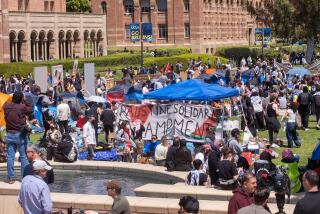Students View Curfew as Crime or Comfort
- Share via
Two of three Ventura County teens participating in a new monthly essay contest sponsored by The Times criticized city curfew laws as unfair.
The contest, first in a series of writing competitions on topics in the news, asked Ventura County high school students to argue for or against laws that keep minors off the streets after dark in local cities.
The question: In an effort to keep young people out of trouble, Ventura County cities have passed curfew laws that require minors to be off the streets late at night. Law enforcement officials say curfews cut crime--but are they fair?
Some essayists supported curfews. But most students--drawing on personal experiences, news accounts and their own feelings about justice--complained that they violate the rights of both teenagers and parents.
They cited concerns about violent crime, a lack of safe things to do at night and fears of a rising police state.
“The government is telling people how to raise their children,” wrote winning essayist Amy Tay, a 17-year-old senior at Westlake High School in Thousand Oaks.
“Though the curfew may seem benevolent enough, it may eventually pave the way for even tighter government control, such as a standard bedtime,” Tay wrote, comparing the laws to those in George Orwell’s novel “1984.”
Tay, who wins $100 for her entry, was among 46 students to enter. Her essay will be published Sunday on The Times Ventura County editorial page and posted on The Times Web site at https://www.latimes.com/essaycorner
“It wasn’t easy picking a winner this month,” said Times Ventura County Edition Editor Bill Overend. “The overall quality of many of the essays was excellent, showing the kind of good writing and original thinking we had hoped these monthly contests would generate.”
Among students supporting curfew laws, most argued the price of restricted freedom is worth paying.
“The government is taking away a right but giving back something to the society, which is safety,” wrote John Vigorita, a St. Bonaventure High School freshman in Ventura. “What could you be accomplishing late at night on the streets? . . . These minors should be at home sleeping or studying for school.”
Jessica Mendoza, a Camarillo High School senior, cited her own experience in arguing for the curfew laws.
“I was only 16, had gotten some burgers with my friends and headed down by the beach to just hang out. Instead, we were confronted by a group of other teenagers who proceeded to rob, beat and terrorize our group,” she wrote.
*
“Even though many of my friends may believe these laws are wrong and discriminate against the good kids just wanting to go out, they don’t realize these laws are really there to protect them,” Mendoza wrote, noting that no curfew was in place at the time she was attacked. “If the police had the power to control the bad element who do loiter and lie in wait to commit a crime, I might have been spared the events of that night.”
Among those opposed to curfews, many objected that they violate the civil rights of teens by punishing the innocent with the guilty.
“I am of Italian descent. Does that mean that I am a member of the Mafia or eat pasta every night?” wrote Megan Mostacciuolo, a Simi Valley High School senior. With curfew laws, “all teenagers are categorized as reckless and irresponsible . . . regardless of their behavioral track record.”
Seung Lee of Westlake High compared the trade-offs of a curfew law to those involved in human cloning, where the moral costs may outweigh the practical gains. “One must . . . take a broader view to realize that there might be a greater loss,” wrote Lee, a sophomore. “Even if a right to walk down a sidewalk at night might seem insignificant, it is necessary to see that insignificant or not, it is still a right.”
Austin Guthals argued city councils are victimizing those who cannot vote to curry favor with adults. “These curfew laws are passed by politicians who want to claim victory over crime,” wrote Guthals, a senior at Westlake High. “They are perfectly happy to restrict someone else’s civil rights for a few votes.”
Others wrote that curfews unfairly preempt parental control.
“It is the right of the parents to regulate the rules within a household. They know their children better than any city council can,” wrote Simi Valley High senior Nam Nguyen. “Let children learn from their primary authority figure, their parents. And let parents decide on how to teach their child.”
Still others were skeptical that curfews cut crime or are practical to enforce.
“The honest teens, whether influenced by their consciences or a $30 fine, stay home, bored,” wrote senior Charles Koller of Buena High School in Ventura. “The others, those few who would actually commit a crime, could care less.”
“If someone is planning a crime, the last thing they are going to worry about is a little curfew ticket,” wrote Casey Martin of Agoura.
*
Many argued that cities would be better achieve their aim by providing alternatives to hanging out on the street.
“While there is a chance that, at a price, a curfew may decrease crime, so might opening a juice bar and a youth center and a good bus route,” wrote Courtney Keene, a senior at El Camino High School, a school for independent study in Ventura. “These methods for keeping kids out of trouble are more cost-effective and just plain more fun.”
More to Read
Sign up for Essential California
The most important California stories and recommendations in your inbox every morning.
You may occasionally receive promotional content from the Los Angeles Times.













